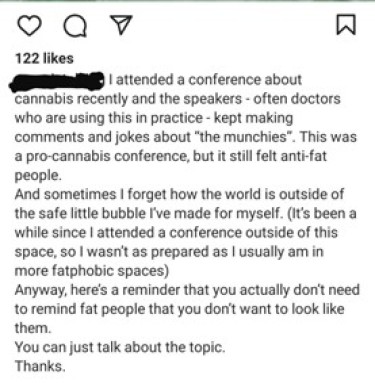
Is cannabis shaming a real thing?
As this one post about a cannabis conference revealed what’s wrong with the world today
Cannabis conference "fatphobic" because of the "the munchies" talk from fatlogic
A recent Reddit post illustrated a comment on the “fatphobic” nature of cannabis conferences due to the mention of cravings. The question then is, does one speak of eating shameful fat people?
Before I get into the rest of the article, I’ll post the original screenshot of the comment here.

As you can see here, the person in question attended a conference and found that talking about “munchis” was a direct attack on fat people.
We would have to assume that the original writer of this comment must be overweight and therefore somewhat ashamed of his current body configuration.
However, this is all fine, but there was one particular phrase in the comment that revealed a deeper revelation about what is happening in the world. It was the phrase, “And sometimes I forget what the world is like outside of the safe little bubble I made for myself.” (It’s been a while since I’ve attended a conference outside of this room, so I wasn’t prepared as I’m usually in more fat-phobic rooms).
In my opinion, this is one of the main reasons why this culture war is taking place in public space. This brings us to a question of subjectivity, the imposition of self on others, and whether or not the world should conform to your personal narratives.
So why not grab a joint or bong, sit back and explore these concepts with me.
Why personal bubbles burst!
Let’s tackle that very first aspect of the commentary, “the safe little engineered bubble.” While theoretically it might seem like a good idea to have a “safe space,” the fact is that empirically, nowhere is safe. Safe is a subjective concept, meaning what you consider “safe” is not necessarily “safe” to someone else.
Essentially, a “safe space” is a place where you can freely express yourself without fear of retaliation from others. In other words, it’s a place where “YOU” is always right and no one else can say anything to disrupt that.
While it’s good to nurture your own self-esteem and talk to your unconscious self regularly, what you do must be objective. Think of it this way when your world is subjectively constructed around your personal narrative and the outside world doesn’t reflect this idealized version of reality – whenever the “consensus reality” tumbles into your bubble… it bursts!
Suddenly you are exposed, outnumbered and vulnerable. How you can feel “safe” now that counter-narratives have invaded your space. How can one “overhear” these stories?
The truth is, you can’t ignore these narratives. You can either redirect or reconstruct the narrative to fit your own, accept it as part of consensus reality, or attempt to fight it to make the world bend to your will.
People who subscribe to the idea of ”safe space” often went on the offensive, trying to change the world’s perspective on their subjective experience. This often backfires and swings the pendulum further away from their truth.
But why is it important? Why is it necessary for some to completely erase the narrative of others? I believe that’s because the counter-narrative throws light on the shaky foundations of her internalized and abiding beliefs.
They can see hints of truth in the counter-argument, which in turn creates a sense of “falsity” in their lives. When their current actions, attributed to their internalized problems, are also part of the reason they are suffering, they choose to overtly ignore those elements in order to repair their damaged internal image.
In the OP’s case, it’s called “talking about cravings” as a fat phobe to claim that “food isn’t why some people get fat”. In fact, we know that exercise, a proper diet, and a balanced psychology are all part of weight retention.
To ignore this fact is to make yourself consciously ignorant of your own problems. It also means that if someone points out this truth, it would be taken as a direct attack on the person holding those views.
In return, they isolate themselves further in their “safe spaces”, find people with similar views and build a “worldview” according to their niche community.
Unfortunately, even within communal disillusionment, the consensus reality will inevitably pop these bubbles en masse.
Why It Feels Better in “Unsafe Rooms”!
Essentially, we want a “safe space” so that we can sleep, rest, heal, and be ourselves. This is the purpose of an environment of this type. This is why we have houses, bedrooms, etc. However, you don’t just live in these rooms and never venture out into the world for fear that “something bad” will happen to you.
Well – some people do, but they typically have a psychological condition that increases their discomfort and perceived hostility toward those around them.
Ironically, during these trying times, a safe place can provide a temporary platform for you to heal, but you can’t outsource that safe place to the world.
The “world” is, by definition, a hostile place where everything is heading towards chaos – everything is in a state of entropy.
This reveals two great truths to us;
-
Your safe bubble is a space that is stagnant in an ever-evolving world
-
What you previously found hostile may have evolved over time, culture, etc.
This means that as long as you remain in your “safe space”, the world outside will continue to evolve and change. The moment you feel “protected” from the old narrative, you realize that in the period that you locked yourself out of the global conversation, you now find yourself confronted with several new narratives—your own question the original position again.
It’s much better to become aware of your problems and learn how to be okay in a difficult situation. To address the root cause of your unhappiness and why that particular idea triggers you so much.
Perhaps in the case of the overweight person, if nutrition is such an important element in eating, the responsibility for the weight would be put back on the person. It would mean that being fat is a choice, and it would take “effort” to change it. Effort that the individual is not willing to pay.
Perhaps it also reveals a deeper underlying issue — her addiction to food.
However, if you want to stop “feeling bad” about these narratives, it’s probably best to:
-
Really analyze the source of your problems, identify if there’s anything you can do
-
Learn to love yourself through the discomfort
-
Make the appropriate changes if you are dissatisfied with your current situation
These are the most effective methods to deal with any kind of problem.
But… but… but… stop making excuses!
The moment the responsibility shifts back to the individual is the moment the apology monster wakes up. It starts finding all the reasons why you can’t do X, Y, or Z.
“I’m poor and I can’t possibly!”
“I’m overweight because of genes!”
“I’m not getting anywhere in life because of ____(fill in the blank)”
This is essentially self-victimization and deprives the individual of all responsibility and power. I’m not saying there aren’t factors that make it “more difficult” for some than others.
For example, it’s much harder to start exercising when you’re overweight than when you’re fit and at your ideal weight. This is because over time you form habits and a certain type of gravity towards certain actions and non-actions.
There is a dynamic in your life.
Breaking that momentum takes effort to change the direction of the momentum even more—but with enough persistence, you can create a new direction and momentum toward what you really want in life.
This is all part of the Great Cosmic Automation and by understanding this you can shape your habits to lead to your ideal life instead of being subject to the power of your current inner automation.
The book Atomic Habits talks about this in great detail.
Your excuses or “reasons” why you can’t will always be the factor that stands between you and the happiness or acceptance you desire. And if you create a safe place where you can hide, where the world can’t talk to you, and where you can’t update your own internals according to the “global script” – then you become a victim even if a Comment is not addressed to yourself.
May this post reflect our own justifications
The person in the post who sensed the aggression of the speakers at this cannabis conference is a more extreme example of what we all do in different situations. We believe that the world must behave according to our criteria, when in fact the world cares about one of our personal belief systems.
There will always be people who will hate you for a variety of reasons, others who will love you for the same reasons. At the end of the day, none of this matters except how you feel. If you need other people to validate your identity, it means you are not living your authentic self.
You are just a fake of what you could be and you are either too scared or too lazy to make the right changes to bring out your best self. Nonetheless, this is something that applies to all of us. So instead of shitting the victim of self-inflicted fat-shaming, let’s look at ourselves and make better decisions.
Burst your Safe Space bubble and enter the real world. It’s not as bad as you think!
CANNABIS AND THE MUNCHIES, READ THIS…

CANNABIS AND THE MUNCHIES, WHY DOES IT ALWAYS HAPPEN?

Post a comment: